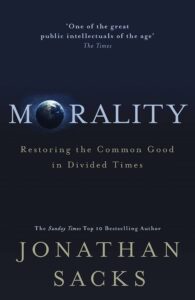By Jonathan Sacks

Jonathan Sacks is the former Chief Rabbi of Great Britain and a well-known writer and speaker. In this fascinating book he deals with a problem which has arisen in the Western world over the past century, but especially since the Sixties: is there a moral law we can all sign up to? The main reason for this problem, he believes, is that western civilization is no longer about ‘us’ but about ‘me’. People are only concerned for society, the nation, humankind in so far as it affects themselves. It is ‘I’ who matters most. Morality can then be summed up as “I can do what I like so long as it doesn’t hurt anyone else.” That is generally enough for modern society. It is not enough, says Sacks, for humankind.
His arguments are well backed up by all kinds of literature, philosophy and sociological research. One typical example speaks for all: the rise in suicides of young to middle aged people. These are people who are able, well educated, successful but commit suicide because they can see no meaning in their lives. The search for ever more exciting experience leads them to the conclusion that there are no more. So why go on living? Research shows that people who concentrate on increasing their own happiness do not in fact become happier. They become more frustrated and depressed as each new experience turns out to be empty. However, people who try to help others find their own happiness increases. They are fulfilled and their lives have meaning. This is not new knowledge; nor is it rocket science. It has been around for centuries, if not millennia. Our modern and post-modern attempt to prove it wrong has clearly failed.
Those of us who believe in God can root our morality in God and in the biblical revelation. Those who do not wish to root their morality in God must still look outside themselves to the people they live with if they are going to be happy.
Clearly this is vastly oversimplified description of a complex but very well written book. It really is a ‘must read’ for our troubled generation.